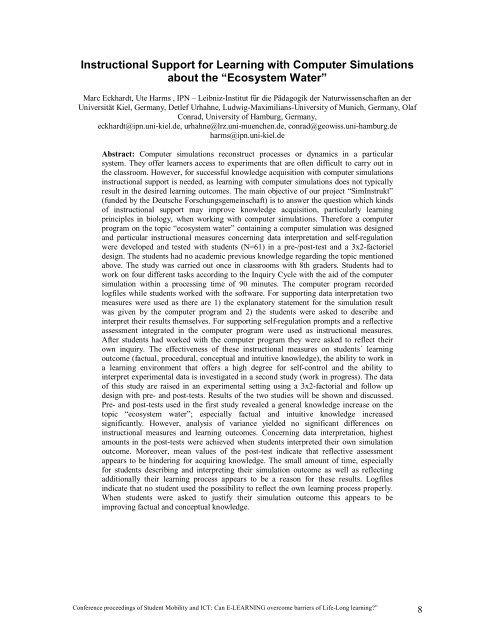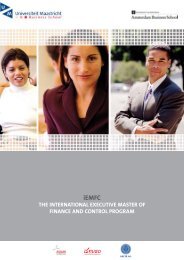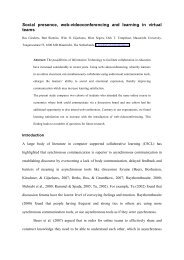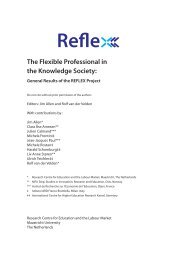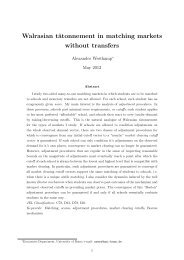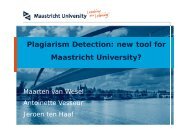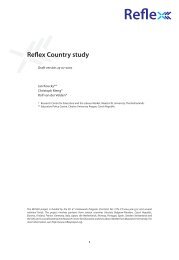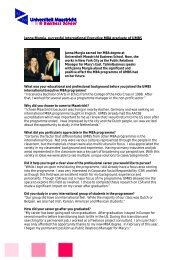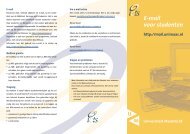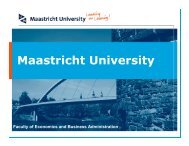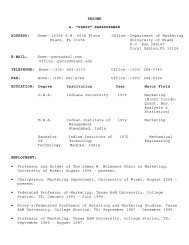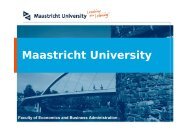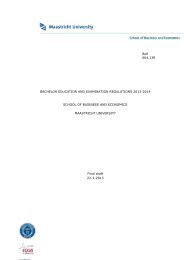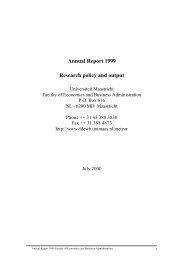proceedings of Student Mobility and ICT: Can E-LEARNING
proceedings of Student Mobility and ICT: Can E-LEARNING
proceedings of Student Mobility and ICT: Can E-LEARNING
You also want an ePaper? Increase the reach of your titles
YUMPU automatically turns print PDFs into web optimized ePapers that Google loves.
Instructional Support for Learning with Computer Simulations<br />
about the “Ecosystem Water”<br />
Marc Eckhardt, Ute Harms , IPN – Leibniz-Institut für die Pädagogik der Naturwissenschaften an der<br />
Universität Kiel, Germany, Detlef Urhahne, Ludwig-Maximilians-University <strong>of</strong> Munich, Germany, Olaf<br />
Conrad, University <strong>of</strong> Hamburg, Germany,<br />
eckhardt@ipn.uni-kiel.de, urhahne@lrz.uni-muenchen.de, conrad@geowiss.uni-hamburg.de<br />
harms@ipn.uni-kiel.de<br />
Abstract: Computer simulations reconstruct processes or dynamics in a particular<br />
system. They <strong>of</strong>fer learners access to experiments that are <strong>of</strong>ten difficult to carry out in<br />
the classroom. However, for successful knowledge acquisition with computer simulations<br />
instructional support is needed, as learning with computer simulations does not typically<br />
result in the desired learning outcomes. The main objective <strong>of</strong> our project “SimInstrukt”<br />
(funded by the Deutsche Forschungsgemeinschaft) is to answer the question which kinds<br />
<strong>of</strong> instructional support may improve knowledge acquisition, particularly learning<br />
principles in biology, when working with computer simulations. Therefore a computer<br />
program on the topic “ecosystem water” containing a computer simulation was designed<br />
<strong>and</strong> particular instructional measures concerning data interpretation <strong>and</strong> self-regulation<br />
were developed <strong>and</strong> tested with students (N=61) in a pre-/post-test <strong>and</strong> a 3x2-factoriel<br />
design. The students had no academic previous knowledge regarding the topic mentioned<br />
above. The study was carried out once in classrooms with 8th graders. <strong>Student</strong>s had to<br />
work on four different tasks according to the Inquiry Cycle with the aid <strong>of</strong> the computer<br />
simulation within a processing time <strong>of</strong> 90 minutes. The computer program recorded<br />
logfiles while students worked with the s<strong>of</strong>tware. For supporting data interpretation two<br />
measures were used as there are 1) the explanatory statement for the simulation result<br />
was given by the computer program <strong>and</strong> 2) the students were asked to describe <strong>and</strong><br />
interpret their results themselves. For supporting self-regulation prompts <strong>and</strong> a reflective<br />
assessment integrated in the computer program were used as instructional measures.<br />
After students had worked with the computer program they were asked to reflect their<br />
own inquiry. The effectiveness <strong>of</strong> these instructional measures on students´ learning<br />
outcome (factual, procedural, conceptual <strong>and</strong> intuitive knowledge), the ability to work in<br />
a learning environment that <strong>of</strong>fers a high degree for self-control <strong>and</strong> the ability to<br />
interpret experimental data is investigated in a second study (work in progress). The data<br />
<strong>of</strong> this study are raised in an experimental setting using a 3x2-factorial <strong>and</strong> follow up<br />
design with pre- <strong>and</strong> post-tests. Results <strong>of</strong> the two studies will be shown <strong>and</strong> discussed.<br />
Pre- <strong>and</strong> post-tests used in the first study revealed a general knowledge increase on the<br />
topic “ecosystem water”; especially factual <strong>and</strong> intuitive knowledge increased<br />
significantly. However, analysis <strong>of</strong> variance yielded no significant differences on<br />
instructional measures <strong>and</strong> learning outcomes. Concerning data interpretation, highest<br />
amounts in the post-tests were achieved when students interpreted their own simulation<br />
outcome. Moreover, mean values <strong>of</strong> the post-test indicate that reflective assessment<br />
appears to be hindering for acquiring knowledge. The small amount <strong>of</strong> time, especially<br />
for students describing <strong>and</strong> interpreting their simulation outcome as well as reflecting<br />
additionally their learning process appears to be a reason for these results. Logfiles<br />
indicate that no student used the possibility to reflect the own learning process properly.<br />
When students were asked to justify their simulation outcome this appears to be<br />
improving factual <strong>and</strong> conceptual knowledge.<br />
Conference <strong>proceedings</strong> <strong>of</strong> <strong>Student</strong> <strong>Mobility</strong> <strong>and</strong> <strong>ICT</strong>: <strong>Can</strong> E-<strong>LEARNING</strong> overcome barriers <strong>of</strong> Life-Long learning?” 8


